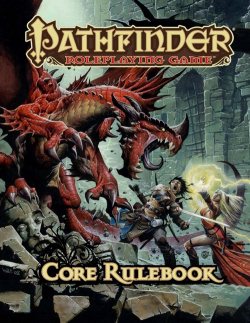User:Wizardoest/Read/Pathfinder Core Rulebook

When D&D 4e came out, Paizo took advantage of this gap (and the OGL) to produce what most gamers consider to be D&D 3.75. Now that I've been playing it for nearly two months, I thought that I would read it and post my thoughts.
Abilities
The effects of having a zero score is listed with the ability description. In d20 3.5 it was listed in the glossary.
- Strength
 A character with a Strength score of 0 is too weak to move in any way and is unconscious.
A character with a Strength score of 0 is too weak to move in any way and is unconscious. A character with Strength 0 falls to the ground and is helpless.
A character with Strength 0 falls to the ground and is helpless.
Why would someone with Str 0 fall unconscious? Especially since a Dex 0 creature is still conscious.
- Dexterity
 A character with a Dexterity score of 0 is incapable of moving and is effectively immobile (but not unconscious).
A character with a Dexterity score of 0 is incapable of moving and is effectively immobile (but not unconscious). A character with Dexterity 0 is paralyzed.
A character with Dexterity 0 is paralyzed.
Why not just define it as helpless? Applying paralyzed may allow it to be fixed by spells that remove the paralyzed condition?
- Constitution
 : A character with a Constitution score of 0 is dead.
: A character with a Constitution score of 0 is dead. : A character with Constitution 0 is dead.
: A character with Constitution 0 is dead.
- Intelligence
 : A character with an Intelligence score of 0 is comatose.
: A character with an Intelligence score of 0 is comatose. : A character with Intelligence, Wisdom, or Charisma 0 is unconscious.
: A character with Intelligence, Wisdom, or Charisma 0 is unconscious.
- Wisdom
 : A character with a Wisdom score of 0 is incapable of rational thought and is unconscious.
: A character with a Wisdom score of 0 is incapable of rational thought and is unconscious. : A character with Intelligence, Wisdom, or Charisma 0 is unconscious.
: A character with Intelligence, Wisdom, or Charisma 0 is unconscious.
- Charisma
 : A character with a Charisma score of 0 is not able to exert himself in any way and is unconscious.
: A character with a Charisma score of 0 is not able to exert himself in any way and is unconscious. : A character with Intelligence, Wisdom, or Charisma 0 is unconscious.
: A character with Intelligence, Wisdom, or Charisma 0 is unconscious.
I prefer how in 3.5 that zeroed abilities applied defined conditions. This reduces ambiguity.
Races
It is nice that all races gain some boon to abilities.
Half Orcs seem playable. Orc Ferocity, which grants the ability to act as if disabled once when reduced to negative hit points, is too circumstantial. The other races have abilities that are more persistent. Might have been better to grant them Diehard as a bonus feat.
Classes
- Barbarian
- Rage powers are mostly good, though some, like gaining low-light vision while raging, aren't.
- Bard
- Much improved. Bardic knowledge is no longer a catch-all, but a bonus to knowledge skills. Spells at first level and I've heard, but not yet read, that the spell list is much improved.
- Cleric
- Turn Undead is now Channeling, which does xd6 positive/negative energy in a 30' radius that effects either living or undead, thus you cannot both hurt undead and heal the party with the same burst. Seen in play and so far all DMs have ignored the negative energy's effect on plants in the radius.
- Community domain grants Mending at will. Keep a collection of Community priests inside the castle to prevent the gate from being smashed in.
- Still reading other domains...
- The rules say explicitly that you cannot end your movement squeezed in a friendly square. D20 was less explicit about this (but clear about hostile squares). If the friendly square is willing to accept the squeeze, it should be permitted with both taking the appropriate penalties.
Done actively reading it
I'm done actively reading the book. I may post random facts as I play the game from time to time. --Wizardoest (Talk) 21:05, 16 October 2011 (EDT)